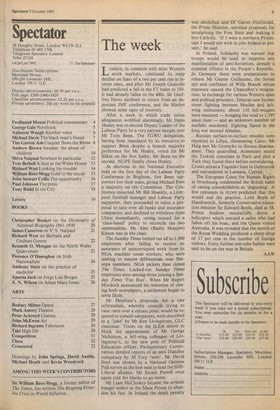The week
London, in common with most Western stock markets, continued its steep decline on fears of a two per cent rise in interest rates, and after Mr Joseph Granville had predicted a fall in the FT index to 150. It had already fallen to the 480s. Sir Geoffrey Howe declined to return from an important IMF conference, and the Market showed some signs of recovery.
After a week in which trade union allegiances wobbled alarmingly, Mr Denis Healey was re-elected Deputy Leader of the Labour Party by a very narrow margin over Mr Tony Benn. The TGWU delegation, having been mandated by its executive to support Benn despite a branch majority preference for Mr Healey, voted for Mr Silkin on the first ballot, Mr Benn on the second. NUPE finally chose Healey.
At elections to the National Executive held on the first day of the Labour Party Conference in Brighton, five Benn supporters lost their seats, giving Michael Foot a majority on the Committee. The Conference mourned Mr Bill Shankly, a Liverpool football manager and Labour Party supporter, then proceeded to reject a proposal to take over all banks and insurance companies, and declined to withdraw from Ulster immediately, voting instead for a 'class-based' policy to reconcile the two communities. Mr Alex (Radio Moscow) Kitson was in the chair.
The Sunday Times locked out all its 1,400 employees after failing to receive an assurance of uninterrupted work from its NGA machine room workers, who were seeking to restore differentials over Natsopa members. NGA pickets then closed The Times. Locked-out Sunday Times employees were among those joining a Sunday Times 'Fun Run'. When Mr Rupert Murdoch announced his intention of closing both newspapers, a settlement began to seem likely.
Mr Heseltine's proposals for a rate referendum, whereby councils trying to raise rates over a certain point would be required to consult ratepayers, were described as a 'joke' by Mr Ken Livingstone, GLC chairman. Tories on the ILEA strove to block the appointment of Mr George Nicholson, a left-wing colleague of Livingstone's, to the new post of Political Education officer. Parliamentary Conservatives derided reports of an anti-Thatcher conspiracy by 30 Tory 'wets'. Mr David Steel was chosen by a National Opinion Poll survey as the best man to lead the SDPLiberal alliance. Mr Enoch Powell once again told the blacks to go home.
Mr Liam McCloskey became the seventh hunger striker in the Maze Prison to abandon his fast. In Ireland the death penalty was abolished and Dr Garret FitzGerald, the Prime Minister, unveiled proposals for secularising the Free State and making it less Catholic. `If I were a northern Protestant I would not wish to join Ireland at present,' he said.
In Poland, Solidarity was warned that troops would be used to suppress any manifestation of anti-Sovietism, already a criminal offence in the People's Republic. In Germany there were preparations to release Mr Gunter Guillaume, the Soviet spy and confidant of Willy Brandt whose exposure caused the Chancellor's resignation, in exchange for various Western spies and political prisoners. Teheran saw further street fighting between Muslim and leftwing enthusiasts: about 110 left-wingers were executed — bringing the total to 1,597 since June — and an unknown number of mullahs murdered. Fighting flared in the Iraq war around Abadan.
Russian surface-to-surface missiles were reported in Libya, threatening Cairo. Mr Haig met Mr Gromyko to discuss disarmament. They quarrelled. Armenians seized the Turkish consulate in Paris and shot a Turk they found there before surrendering. Croats seized a Yugoslav liner in Dubrovnik and surrendered in Larnaca, Cyprus.
The European Court for Human Rights at Strasbourg condemned the British habit of caning schoolchildren as 'degrading'. A few optimists in STOPP predicted that this would end the practice. Lord Boyle of Handsworth, formerly Conservative education minister Sir Edward Boyle, died at 58. Prince Andrew successfully drove a helic.opter which rescued a sailor who had fallen off his boat, and the Queen visited Australia. It was revealed that the month of the Royal Wedding produced a sharp drop of 17 per cent in the number of foreign visitors. Forty further test-tube babies were said to be on the way in Britain.
AAW






































 Previous page
Previous page